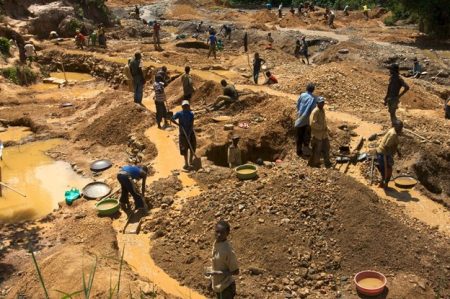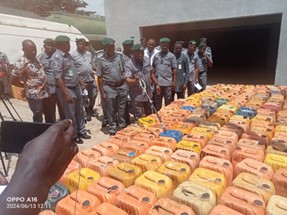
Ike Amos
Abuja — Indigenous oil and gas service companies, under the umbrella body of Project 100, yesterday, described the commissioning of the seventeen-storey Nigerian Content Tower by President Muhammadu Buhari as an enormous step towards expanding local content development and a feat capable of attracting more investors into Nigeria’s oil and gas sector.
President Buhari, had on Thursday, commissioned the seventeen-storey headquarters of the Nigeria Content Development and Monitoring Board, NCDMB, in Yenagoa, the Bayelsa State capital.
The NCDMB building comes with its own 10-Megawatt gas-fired power plant and a 1,000 seater conference hall.
In a statement in Abuja, the Project 100 beneficiary companies in a congratulatory message to the President, the Minister of State for Petroleum Resources, Chief Timipre Sylva and the Executive Secretary the NCDMB, Engr. Simbi Wabote, applauded them for demonstrating a strong political will in continuing the project and completing it in record time.
The statement signed by the Chairperson of the Project 100 Executive Committee, Mrs. Funmi Ogbue, said the completion and commissioning of the tower would further create the enabling environment for oil companies to interface better with the NCDMB and also for companies willing to relocate their offices to the region.
She added that the 10-Megawatt gas-fired power plant and 1,000-seater conference hall, as well as other infrastructures within the tower could serve as incentive for oil companies to open new operational offices since siting within the cluster of the tower would allow for sharing of critical infrastructure, like power, technology and a host of other resources.
The ultra-modern tower was started in 2015, executed by an indigenous company, using mostly locally sourced materials and labour. The project generated over 250 direct and indirect jobs and created vast opportunities for artisanal skill development.
Ogbue, who is also the Managing Director of Zigma Limited, one of the Project 100 company, expressed the delight of the Project 100 companies over the new building, especially the fact that it was delivered by local contractors and supported by other local engineering and project consultants.
She said the Project 100 companies share the belief of President Buahri that local production and patronage of Nigerian goods and services was one of the surest ways to empower citizens, and give them viable opportunities to excel.
Ogbue said: “P100 companies align with the president’s speech that completion of the project reflects the drive of the present administration to provide infrastructure across the country to serve as a monument for investment and enabler for job creation.
“We salute President Buhari’s commitment for continuity, and a demonstration that skyscrapers and other laudable structures can be built in the Niger Delta.”
Continuing, she said: “On our part as Project 100 Companies, we wish to reiterate our commitment to supporting the present administration to invest more in infrastructure development and initiatives that would open up the Niger Delta region.
“We assure the president, Minister of State for Petroleum Resources and the Executive Secretary of the NCDMB, of our resolve to critically pursue good governance, quality assurance, adaptability and growth, resilience in the conduct of our operations to create businesses that will expand to and within the Niger Delta region.”
She stated that the increased involvement of Project 100 companies in supply chain of projects, such as the Nigerian Content Tower, would be a major boost in the quest to collectively support local companies to become large enterprises and deepen Local Content practice in the oil and gas industry.
Project 100 which was conceived in 2017, is an initiative of the Ministry of Petroleum Resources and the NCDMB to identify 100 Nigerian oil and gas service providers and support them through special interventions to facilitate their incubation, maturation and growth into world class service companies.
Sixty oil service companies currently make up the scheme with capacity in six core service areas and more than 200 technical service offerings.



